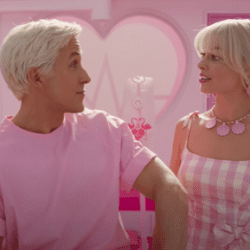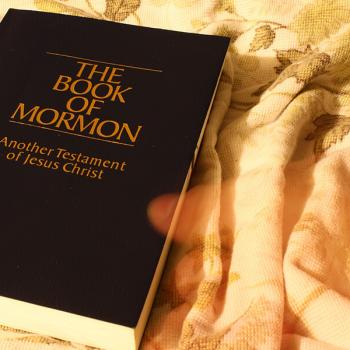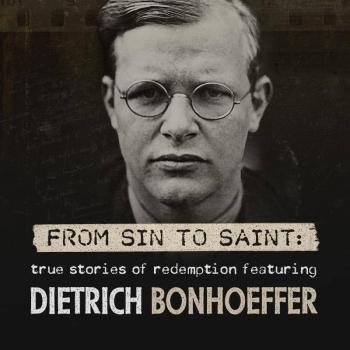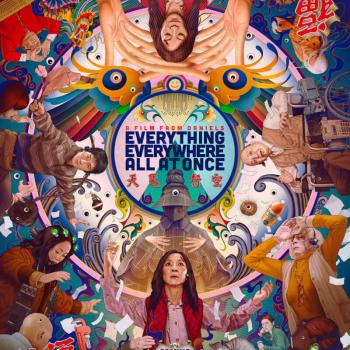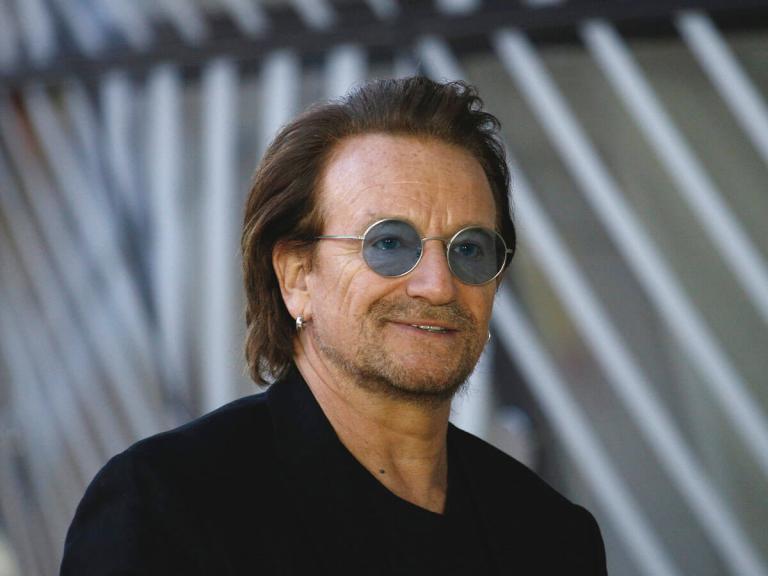
I’m staring at a computer screen in my Colorado office one fine fall day in 2001 when the phone rings. “Hello, my name is Jack Heaslip,” says a voice with a foreign accent. “The boys in the band call me Father Jack, and I’m their chaplain.” He proceeds to tell me his role in helping to bring together four aimless souls at an Anglican school in the mostly-Catholic Republic of Ireland. They formed a garage band that went on to become the renowned and durable rock & roll group known as U2.
Father Jack continues, “The boys were staying up way too late after the concerts, and facing all sorts of temptations. So we started a practice of having them study a book or the Bible together, and they’ve read a couple of your books, including What’s So Amazing About Grace. Well, we’re all coming to Denver for a concert in November, and Bono would like to meet with you. Would that be all right?”
I love music, and listen to it all day long as I work. But I have a limited range: classical music written before the twentieth century. Yet even I have heard of U2, so I tell Father Jack that I’d be happy to meet with Bono.
A few weeks later Father Jack phones again from Ireland on a staticky line. “Philip, it turns out that all four of the boys want to meet, so I need to ask you a favor. Could you find a restaurant with a private room just a couple of blocks from the hotel where we’ll be staying? We can all have lunch together with you and your wife, but it needs to be in a secure place because there will be fans milling around.”
Janet, my wife, takes on the restaurant assignment, and soon locates an appropriate venue. We’re eating dinner at home one night, and out of nowhere she says, “Philip, since U2 is coming to our turf, I think we should pay for the lunch. That would be the gracious thing to do.”
I stare at her, aghast. “What? This is the $100 million Elevation Tour they’re on! I read that their daily overhead for the 104-member touring group is $750,000. Lunch for seven is a tiny blip of an expense. They’ll never even see the bill, it gets gobbled up. For us to pay makes no sense. They asked for the lunch, not me.” Round one.
Two weeks later, the issue comes up again during another dinner. Janet says, “I’d like to revisit a conversation we had concerning the lunch with U2. You’re right, they always pick up the tab on a tour like this. That’s my point. You wrote a book about grace. Maybe we should show them some grace with a wholly unexpected gesture.”
As calmly as I can, I repeat my arguments. “Paying for a lunch means nothing to them. Yes, we could probably afford it, but why should we spend all that money unnecessarily.” Round two.
A week before the concert date, Janet raises the issue once more. After thirty years of marriage, I’ve learned a few things. I respond, “OK, I can tell this is important to you. I don’t really understand why, but if it’s important to you, it’s important to me too.” She thanks me, and says she’ll call the restaurant and give them a credit card they can charge directly, to avoid any arm-wrestling over who pays the bill. I surrender.
On the day of the concert, we go to the hotel in downtown Denver where the band is staying. Mobs of teenagers are standing outside, trying to get a glimpse of their idols. Father Jack spies us in the lobby, introduces himself, and says, “As you can see, we won’t be able to walk to the restaurant, not with this crowd. So a limousine will soon pull up, and you can hop in with Bono. The others and I will see you at the restaurant.”
Sure enough, the restaurant has an elegant private room, though it faces the street with café curtains blocking the view. At first, we see the bobbing heads of fans as they jump up to peer inside. The restaurant hostess dispatches security guards to keep the crowd away, although one eager fan manages to sneak inside and gets Bono to sign his sunglasses.
In advance of our lunch, the worship leader at my church, worried about my ignorance of rock music, has burned a CD of U2’s greatest hits for me to listen to, and I’ve come prepared. He needn’t have bothered. The guys talk about their families and life on the road for a while, until Bono takes over. He’s come to talk about issues.
They’ve just arrived from New York, where Mayor Rudy Giuliani gave them a tour of the World Trade Center disaster site. An unabashed admirer of the United States, Bono feels the attack like a blow to the gut. He’s read an article I wrote about it [link] and quizzes me about every detail.
Meanwhile, a server enters the room several times to take our order and, noting the intense conversation, steps back outside. Finally the Edge stops her and says, “We haven’t had time to review your appetizers. Why don’t you bring us one of each.” Ka-ching—I silently calculate how much that will cost. “Oh, and could you bring us a few bottles of good wine, both white and red. Ka-ching, ka-ching.
Lunch proceeds for three-and-a-half hours, with our talk centering on Bono’s activist agenda. The previous year he had lobbied President Clinton and the U.S. Congress on the Jubilee 2000 project, which helped cancel $100 billion in debt for thirty-five of the world’s poorest countries. President Clinton joked that a stranger wearing sunglasses and with only one name showed up in the White House one day and wouldn’t go away until Clinton met with him. He credits Bono for persuading senators on both sides of the aisle to agree on debt forgiveness.
Now that George W. Bush has taken office, Bono has his sights on the HIV/AIDS crisis in Africa. He’s contemplating a plan to take a cross-country bus tour to Christian colleges and megachurches, speaking to them about AIDS. He quotes Bible passages on justice and compassion, and fires off statistics on the disease that threatens to produce fifteen million AIDS orphans in Africa.
We could talk for hours more, but eventually one of the band members checks his watch and says, “Hey, we have a sound check in about an hour.”
“Right,” says Bono. “And one of the crew has a birthday tonight. We need a place to hold a party.” Just then the restaurant manager ducks in to see if we need anything else. “Good timing,” Bono says to her. “We’re looking for a place to feed the whole traveling gang tonight. You’ve provided a great lunch. Could you accommodate our whole crew for dinner tonight—including a big birthday cake?”
“Uh, how many would that be?” she asks.
“Just over a hundred, if everybody shows up.”
She blinks, and gulps hard. “Sure, Mr. Bono. We’ll close the restaurant and make it a private event for your crew.”
While she’s standing there, Bono asks Father Jack to take care of the bill. “Oh, that’s not necessary,” the manager says. “The Yanceys have already paid.”
Bono stares at her blankly, as if she’s told a joke. “It’s true,” says Father Jack. “They insist. It’s an act of grace.”
Bono looks at Janet and then at me. I mumble something about wanting to extend grace since they are on our turf. “But, but…OK, thank you very much. That is indeed gracious. But when are you coming to Dublin? We’ll treat you right.”
And so it happens that the following year we dined with the Edge at a Dublin hotel owned by U2 and spent the night in Bono’s guest house. At breakfast the next morning, Bono burst in from the airport with all the excitement of a rock band groupie: “You won’t believe where I’ve just been. First I met with President Bush on HIV/AIDS. Then I went to Black Mountain, North Carolina, to see Billy Graham, who gave me his blessing!”
Moral of the story: listen to your wife.
Between last November and May of this year, Bono gave twenty-six solo shows in seven countries. He stood onstage in medium-sized theaters rather than outdoor stadiums, with no pyrotechnics and no backup from the band, just a cello, harp, and keyboard. It was a book tour like no other, introducing his memoir Surrender, which he wrote “all by meself” during the pandemic, when concerts were canceled. He titled the book tour “Stories of Surrender: An Evening of Words, Music and Some Mischief.”
At the end of each stop on the Stories of Surrender tour, Bono thanked the United States for letting him in and for responding to his appeals for justice. “We all need your country to exist. America is a song not yet written. The whole world is waiting to see what America is going to be.”
During the show, one of the most famous musicians in the world gave intimate glimpses of what had formed his distinctive life:
—The early years, when band members joined a small, charismatic house church called Shalom. “Religion can get in the way of Jesus,” Bono reminisced, and this church called him back to a New Testament time when people gathered together and honestly grappled with what a Jesus follower should look like. They parted ways when some in the church became convinced the fledgling band should break up. Bono disagreed: “Jesus is very rock ’n’ roll to me,” he said. “Turns out, you can change the world and have fun at the same time.”
—His marriage to Ali. When Bono’s mother died, leaving him emotionally adrift, Ali became the shoulder on which he leaned. He pursued her for almost a decade before she agreed to marry him. Ali had her own career goals, and the public spotlight of her workaholic husband led to marital strain. But they stuck it out, and last year celebrated their fortieth anniversary. “Grow up,” she told him—“but not completely.” He took her advice: “I’m still a boy, but a better man because of this woman.”
—The six weeks in 1985 that he spent in Ethiopia with Ali, in the midst of the AIDS crisis. They worked in an orphanage, where he composed songs for the kids about eating their vegetables. “Those weeks changed me forever,” he said. “They lit a fire in me that has never gone out.” Presidents Bill Clinton and George W. Bush have publicly thanked Bono for his leadership in a campaign that is credited for saving twenty-five million lives in Africa.
—His tireless activism, culminating in his One campaign, and Product Red. Bono gets criticized for trying to save the world. “I care about justice. If there’s justice, we don’t need charity. Poverty is not natural, but manmade, and can be overcome by the actions of women and men—most likely women.”
—His defiant faith. As he told an agnostic French journalist, “It’s a mind-blowing concept that the God who created the Universe might be looking for company, a real relationship with people, but the thing that keeps me on my knees is the difference between Grace and Karma. …I’d be in big trouble if Karma was going to finally be my judge. It doesn’t excuse my mistakes, but I’m holding out for Grace. I’m holding out that Jesus took my sins onto the Cross, because I know who I am, and I hope I don’t have to depend on my own religiosity.”
In Yahweh, a song he often performs before stadium crowds, Bono offers God his hands, which clench into fists, his mouth “so quick to criticize,” and finally his heart: “Take this heart, and make it break.” He told me once, “It’s crazy that because I’m a rock star, people listen to what I say about politics, and justice, and poverty, and Jesus. But there it is. As long as I have the platform, I’ll keep having my say.”
Don’t ever stop talking, Bono. But don’t stop singing either. You’re spreading the message of grace in places where it’s rarely heard.





